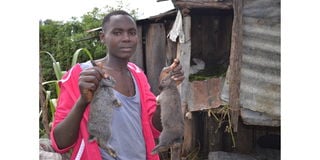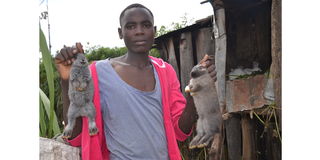Premium
Rabbit rearing venture keeps student's family going during pandemic

Seventeen-year-old Joseph Mwangi displays two of his rabbits at his family's home in Leshau village, Nyandarua County.
What you need to know:
- His venture has kept his humble family going during the pandemic.
- With schools closed since March, his venture has kept him busy throughout.
Seventeen-year-old Joseph Mwangi has every reason to smile.
His venture into rabbit rearing when schools were closed due to the outbreak of Covid-19 is paying dividends.
His rabbits rearing venture has kept his family afloat during these tough economic times.
Mwangi, a Form Three student at Damview Secondary School in Ndaragwa Constituency, Nyandarua County, says he started rearing rabbits as a hobby which has eventually turned into a lucrative venture.
“I started as a hobby because of my love for agriculture both as a subject in school and in practice. I also wanted something to keep me busy at home after the closure of learning institutions due to Covid-19," Mwangi says.
“I picked rabbit rearing because it does not need much monetary investment,” the teenager told the Nation at his parents’ home in Leshau area, Ndaragwa.
He says he started with two does and a buck which were between five and six months old; two California White and a Flemish Giant which he bought at Sh300 each from a neighbour.
“Now I have 33 rabbits from the three I bought in March, although I have sold some," says the teenager as he rushes to attend to a customer who had placed an order for two rabbits the previous day.
According to the young farmer, a rabbit matures in four to five months when the doe is ready for mating and the buck fat enough for slaughter and breeding purposes.

Seventeen-year-old Joseph Mwangi displays two of his rabbits at his family's home in Leshau village, Nyandarua County.
“The rabbits’ gestation period is 32 days before it kindles between 6 and 12 kittens that mature in another four months,” he notes.
It is not recommended for the rabbits to share a cage as a way of controlling breeding and cannibalism as they often fight, especially at night, according to Mwangi.
“For breeding purposes, one should always go for a healthy rabbit with appropriate body weight. It is also not recommended for one to use the male rabbits for breeding purposes when they are below five months of age to ensure a quality young rabbits,” he adds.
Mwangi sells his rabbits to area residents and rabbit butcheries with the selling price determined by the weight, size and the rabbit's breed.
Mwangi says he sells a rabbit which is two to three months old at a price of between Sh100 and Sh200, whereas a four to five months old rabbit goes for between Sh300 and Sh800 each.
“On a bad week, I normally sell at least four rabbits making sales of about Sh1,200 while on a good week I sell up to eight rabbits and pocket Sh 2,400,” explains Mwangi, adding that his mother has been of great help to him, especially in the marketing of the animals.
“When I started out, I didn't think of the market. But as my rabbits grew in number, I thought of making money from what I had started for fun,” he explains.
With schools closed since March, his venture has kept him busy throughout.
Tending to his rabbits
“I am always busy, either I'm looking for rabbit feeds, constructing new cages or just watching them feed while I rest,” he notes.
His mother, Mercy Njeri, reveals that her son spends most of his time tending to his rabbits.
“With my son, I have realised that rabbits are such friendly animals to keep. In addition, the starting capital is low, since he only started with two rabbits which have multiplied very fast,’’ Ms Njeri says.
Mwangi says that he feeds his rabbits using fresh vegetables, weeds and maize jam. In addition, he gives them fresh water.
“Rabbit rearing is a very easy and entertaining venture and very profitable. Their feed is affordable and easy to get and the rabbits do not need much tending as compared to rearing of other farm animals,” he notes.
The young farmer says he hopes to enter into a business agreement with rabbit meat processing companies in future and after completing his studies.
“At the moment I am focusing on completing my studies but I'm looking forward to becoming a large scale rabbit farmer,” he adds.
Mr Joel Gitimu, who owns a rabbit butchery in Mairo Inya Township, says rabbit meat, being white, has quite a high demand.
“People have realised the benefit of rabbit meat and are now turning to it. This has increased the demand for rabbit meat,” says Mr Gitmu.
At his butchery one kilogramme of rabbit meat goes for Sh500.
“Rabbit meat is first allowed to drip-dry under the sun or smoked, before it is fried, boiled or baked for a delicious meal.”
Ms Angela Maina, a nutritionist in Nyahururu town notes that rabbit meat is among the best sources of protein and it is more nutritious than other meats.
According to the nutritionist, rabbit meat is rich in protein and is recommended for children with stunted growth and non-communicable diseases as a result of overdependence on Irish potatoes and cabbages for meals.
“Rabbit contains less fat and more protein as compared to turkey, beef, pork and chicken meat,” says Ms Maina.
Nyandarua County Agriculture Executive, James Karitu notes that the county was working on breeding stocks at its Ol Joro Orok Agricultural Training College, while promoting consumption among residents for nutrients boost.
“The county has stunted growth amongst its population as a result of protein deficiency and over reliance on carbohydrates. Rabbit meat, coupled with pork that we are promoting among our families is the solution to provide our children and general population the much needed balanced diet,” he adds.





